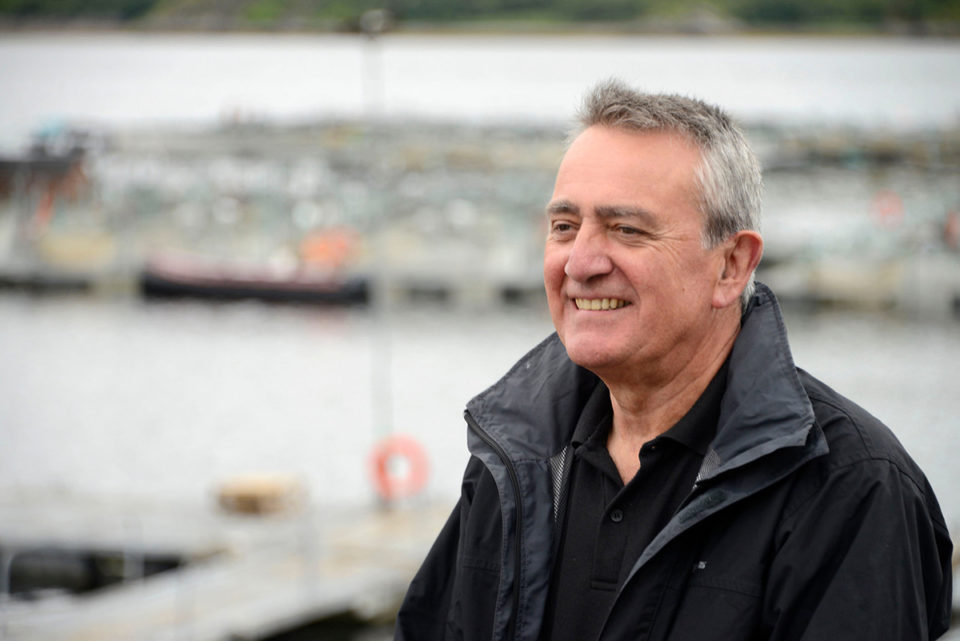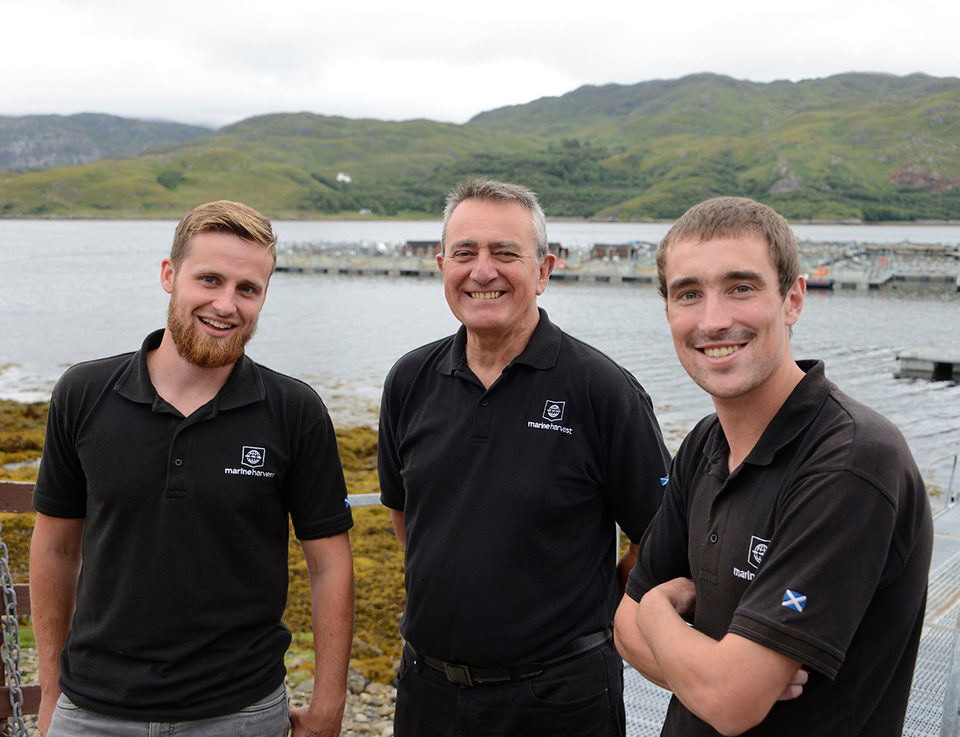Marine Harvest’s Steve Bracken reflects on aquaculture’s past and future

As with so many enduring, successful relationships, this one began with the briefest of encounters.
It was a newspaper small ad, glimpsed in a library reading room, that piqued the curiosity of a young Scotsman, offering him not just an inkling of romance, an element of intrigue, but a journey into the unknown.
It seemed an unlikely pairing. A recently graduated city dweller, who had fished just once before – unsuccessfully – and who had never piloted a boat, and a fledgling salmon farming industry finding its way through uncharted, often choppy, waters. Four decades later, as Steve Bracken retires from fish farming – successfully – he recently reflected on his career producing Scottish salmon and shared with the Advocate his well-earned perspectives on aquaculture’s past and future.
He retires this week after 41 years with Marine Harvest, the world’s largest farmed salmon producer.
“Fish farming sounded new and different,” recalled Bracken, whose career has also taken him to unusual places: He would eventually spend three years farming black tiger prawns in Sri Lanka in the late 1980s and early ‘90s.
Bracken recalls responding to that newspaper ad, pitching his services to Unilever, which at the time owned a salmon site in the tiny, rural community of Lochailort. When they accepted him as a fish farm assistant, it was the start of a lasting association with an industry that now accounts for 40 percent of Scottish food exports and brings £2 billion annually to Britain’s economy.
“When confirmation arrived on Unilever letter-headed paper, I realised this was going to be serious business,” he said. “It was exhilarating, though, being in a new location, meeting new colleagues in a job you knew very little about.”
For Bracken, who grew up in Edinburgh, a frisson could be found from day one on the job. Scotland’s West Highlands – vast, spectacular and remote – were the perfect setting for someone seeking a career outdoors and it was there that he thrived.
The location, and particularly the labor, demanded a no-frills approach. At the time, when Scotland was annually producing as little as 250 metric tons of salmon, fish were hand-netted out of a pen and placed on a crudely carpeted raft. Workers would kneel and gently hold a fish, using a wooden “priest” to stun and kill each salmon by hitting it on the head.
“The fish were not bled and gutted,” said Bracken, “but packed into wooden crates with a polystyrene liner, then iced and lidded. When we were first asked to do gutting and bleeding, we thought, ‘This will never catch on.’”
But it did.

Salmon was sold mainly to small UK smokers – mostly in London – as well as French wholesalers and small retailers. Markets have since diversified vastly. The 170,000 metric tons of Scottish salmon produced last year went mainly to Europe, the United States and Asia as well as emerging markets in India and Africa. Regardless of trends, Scottish farmed salmon has always been perceived as a quality product.
Still, the challenges facing Scottish producers are many: sea lice, fish escapes and bacterial and viral diseases, to name a few. So too are the objections from critics, which include claims of pollution and threats to wildlife.
Adapting to significant changes in breeding, nutrition, health and safety, technology and training has been vital to our success. But without community support, you will struggle in everything you aspire to do.
And like anyone who makes their living in the sector, Bracken has had his lessons to learn; never more so than in the late 1970s and early 80s, when the bacterial disease furunculosis – which sees fish develop boils – was rife.
“The industry was taking off, but we still had many environmental, husbandry and fish health challenges to deal with,” he said. “Basically, the industry was expanding too quickly without dealing with the pressing matters at hand.”
Marine Harvest worked with industry partners and government to produce a vaccine that transformed the sector’s fortunes. Without that cooperation, added Bracken, the Scottish industry would not be in such good shape today.
Critics who say current self-regulation is not working and that planned growth is not sustainable fear a repeat of unmanaged expansion, but Bracken disagrees: “The mistakes we made in the 1980s are still seen in some quarters as our current practices, but the lessons we learned were a vital legacy,” he said. “If salmon escape, if seals are shot as a last resort or fish are accidentally killed, then criticism is understandable but, if criticism is mischievous, ill-informed or outdated, then that is unfair. Some challenges, such as stocking densities, are easy to address but others are down to who is shouting loudest.”
The current challenge, said Bracken, is ensuring that producers’ voices are heard in the right places with the facts. He counts chairing the Scottish Government’s Improved Containment Working Group and producing the Scottish Technical Standard as career highlights.
He’s also had a hand in bringing Marine Harvest into the Royal Society for the Prevention of Cruelty to Animals’ welfare standard scheme, as well as working closely with remote communities that the company serves.
“Adapting to significant changes in breeding, nutrition, health and safety, technology and training has been vital to our success,” said Bracken. “But without community support, you will struggle in everything you aspire to do. I have been fortunate to work for a company that I genuinely believe has always been committed to doing the right thing.”
Editor’s note: Ian Roberts will replace Bracken upon his retirement on August 31. As Marine Harvest Scotland’s new director of communications and business support, Roberts brings with him over 25 years aquaculture experience working in farming, communication and building indigenous partnerships in British Columbia, Canada.
Follow the Advocate on Twitter @GAA_Advocate
Now that you've finished reading the article ...
… we hope you’ll consider supporting our mission to document the evolution of the global aquaculture industry and share our vast network of contributors’ expansive knowledge every week.
By becoming a Global Seafood Alliance member, you’re ensuring that all of the pre-competitive work we do through member benefits, resources and events can continue. Individual membership costs just $50 a year. GSA individual and corporate members receive complimentary access to a series of GOAL virtual events beginning in April. Join now.
Not a GSA member? Join us.
Author
-
Ronald Kerr
Ronald Kerr is based in Fife, Scotland, and has worked as a journalist for nearly 40 years.
Tagged With
Related Posts

Health & Welfare
On the Job: Young fish veterinarian holds a hopeful outlook
Harry Hamlin-Wright is a fish vet. It’s a career choice that gets strange looks but offers him varied and interesting work. See the world of aquatic animal health and welfare through a fresh set of eyes in a new Advocate series on aquaculture jobs.

Intelligence
On the Job: Modern-day oyster lassies
As part of a series looking at aquaculture jobs, we feature two women working with oysters at different ends of the supply chain.

Health & Welfare
Stirling researcher preps eyestalk-ablation alternative trials
University of Stirling Ph.D. student Simão Zacarias, who is from is Beira, Mozambique, will soon travel to Isla del Tigre, Honduras, to document evidence showing the benefits of breeding shrimp without eyestalk ablation. His is a journey of hopeful discovery.

Aquafeeds
It takes guts to advance sustainability in aquaculture
With byproducts representing between 25 to 50 percent of the weight of various fish species, we need to be looking at how the entire fish is being used: even the heads, guts and skin.


